
FINANCE A UVER-CZECH JOURNAL OF ECONOMICS AND FINANCE
Scope & Guideline
Advancing Knowledge in Economic Theory and Practice
Introduction
Aims and Scopes
- Financial Risk Management:
The journal explores various strategies for managing financial risks, including extreme risks associated with commodities, equity returns, and systemic risks, through innovative modeling approaches. - Economic Policy Analysis:
Research often focuses on the implications of fiscal and monetary policies on economic growth, inequality, and market stability, providing insights that are relevant for policymakers. - Market Behavior and Investor Sentiment:
It delves into the behavioral aspects of financial markets, investigating how investor sentiment influences asset prices, particularly in volatile environments. - Corporate Governance and Finance:
The journal examines the relationship between corporate governance structures and financial outcomes, such as tax avoidance and dividend policies, emphasizing the importance of governance in financial decision-making. - Macroeconomic Relationships:
A core focus is on the dynamic interplay between macroeconomic indicators and financial markets, utilizing advanced econometric techniques to uncover causal relationships. - Empirical Analysis in Finance:
The journal encourages empirical research that utilizes various data sources and statistical methods to test financial theories and elucidate real-world financial phenomena.
Trending and Emerging
- Machine Learning in Finance:
There is a growing trend toward the application of machine learning techniques for predicting financial outcomes, enhancing the accuracy and sophistication of financial analysis. - Impact of Climate Change on Financial Markets:
Research is increasingly addressing the intersection of climate policies and financial market behavior, highlighting the relevance of environmental concerns in economic analysis. - Behavioral Finance and Investor Psychology:
Emerging studies focus on the psychological factors influencing investor behavior, particularly during periods of market uncertainty, reflecting a broader interest in behavioral finance. - Public Finance and Inequality:
The nexus between fiscal policies and economic inequality is becoming a focal point, with researchers investigating how government actions impact income distribution and social equity. - Cross-Border Financial Dynamics:
As globalization increases, there is heightened interest in understanding cross-border financial contagion and the implications of multinational finance, particularly in the context of systemic risk.
Declining or Waning
- Traditional Economic Theories:
There has been a noticeable decrease in the publication of papers strictly adhering to classical economic theories, as researchers increasingly favor empirical and interdisciplinary approaches. - Static Risk Models:
Static models of risk assessment, which do not account for time-varying factors, are becoming less prevalent, with a greater emphasis on dynamic and multiscale approaches being favored. - Localized Financial Issues:
Research that focuses exclusively on localized financial issues without broader implications or comparative analysis is declining, indicating a shift towards more global perspectives. - Basic Descriptive Studies:
There appears to be a waning interest in studies that merely describe financial phenomena without offering deeper analytical insights or novel methodologies. - Generalized Quantitative Methods:
Generic applications of quantitative methods are being overshadowed by the adoption of advanced techniques such as machine learning and other data-driven approaches.
Similar Journals
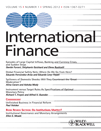
International Finance
Pioneering research at the intersection of finance and geography.International Finance is a prestigious academic journal published by WILEY, dedicated to the exploration and advancement of theories and practices in the realms of finance, development, and geography. With a strong emphasis on empirical and theoretical research, this journal provides a crucial platform for researchers, professionals, and students to disseminate cutting-edge findings that shape our understanding of the financial landscape on a global scale. Holding an impressive impact factor and categorized in the Q2 quartile across multiple disciplines, including Development, Finance, and Geography, the journal has established itself as a significant contributor to scholarly discourse. Since its inception in 1998 and spanning until 2024, International Finance offers a comprehensive overview of current trends and challenges faced in financial contexts, enhancing the decision-making processes within academia and industry alike. Although the journal is not open access, its rigorous peer-review process guarantees high-quality content that is indispensable for anyone engaged in the diverse fields intersecting with finance.

International Journal of Financial Studies
Exploring the forefront of financial innovation.The International Journal of Financial Studies is a premier publication dedicated to advancing the field of finance through open-access research. Published by MDPI based in Switzerland, this journal offers researchers, professionals, and students a platform to disseminate their findings in an accessible format since its establishment in 2013. With its ISSN of 2227-7072 and a commendable impact reflected in its Q2 ranking in finance, it occupies an influential position among finance-related journals, as evidenced by its 65th percentile rank in Scopus. The journal encompasses a wide array of topics in finance, making it essential reading for those seeking to stay abreast of current research trends and methodologies. As an open-access journal, all articles are freely available, significantly enhancing the visibility and reach of published studies, which is crucial for fostering collaboration and innovation within the global financial community. Published continuously until 2024, the International Journal of Financial Studies is not just a source of knowledge; it is a critical contributor to the progression of financial scholarship.
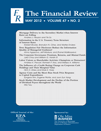
FINANCIAL REVIEW
Shaping the Future of Economic DiscourseFINANCIAL REVIEW, a premier journal in the fields of Economics and Finance, is published by Wiley and has been contributing to the body of knowledge since its inception in 1969. With an impressive track record reflected by its Q1 ratings in both Economics and Econometrics as well as Finance, this journal stands out as a crucial resource for researchers, professionals, and students alike. The journal hosts a diverse array of scholarly articles that not only address contemporary financial issues but also provide innovative insights into economic theories and practices. Although it does not offer open access, its high impact factor and strong Scopus rankings—ranking #275 out of 716 in Economics and Econometrics and #125 out of 317 in Finance—underscore its significance in advancing academic discourse and influencing policy in the financial sector. Researchers are encouraged to explore the latest findings and methodologies shared in this esteemed journal, ensuring they remain at the forefront of their fields.

Annual Review of Financial Economics
Navigating the Complexities of Market BehaviorAnnual Review of Financial Economics, published by Annual Reviews, stands as a pivotal journal in the fields of Economics and Finance, recognized for its rigorous analysis and comprehensive reviews since its inception in 2010. With an impressive impact factor reflected in its Q1 ranking in both Economics and Econometrics and Finance for 2023, this journal serves as an essential resource for researchers, professionals, and students keen on understanding the dynamic interplay of financial theories and practices. The ISSN 1941-1367 and E-ISSN 1941-1375 signal its commitment to accessibility and dissemination of cutting-edge research within the community. Addressing crucial topics from market behavior to economic modeling, each annual volume synthesizes the latest findings and theoretical advancements, thus contributing significantly to the global discourse within financial economics. With its high Scopus rankings, including a finance rank of #75 out of 317, the journal continues to foster a deep understanding of financial systems and their implications, serving as an invaluable tool for anyone engaged in the broader economic landscape.
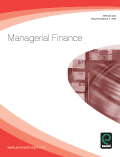
MANAGERIAL FINANCE
Empowering Research in Finance and Management.MANAGERIAL FINANCE is a prestigious academic journal published by Emerald Group Publishing Ltd, focused on the areas of finance, management, and strategy. With an ISSN of 0307-4358 and an E-ISSN of 1758-7743, this journal has carved a niche for itself within the business and financial sectors, achieving a commendable Q2 category ranking across multiple domains, including Business, Management and Accounting, Finance, and Strategy and Management, as of 2023. The journal aims to provide a platform for insightful research and critical analysis while fostering an understanding of contemporary financial practices and theories. With its wide-ranging scope, it serves as a vital resource for researchers, professionals, and students alike, looking to stay abreast of the latest trends and challenges in managerial finance. The editorial board is committed to maintaining academic rigor, ensuring that articles published are of the highest quality and relevance to the field. By bridging the gap between theory and practice, MANAGERIAL FINANCE is an essential reference for anyone involved in financial decision-making and strategic management.
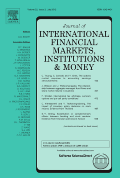
Journal of International Financial Markets Institutions & Money
Illuminating the Dynamics of Global MarketsThe Journal of International Financial Markets, Institutions & Money, published by Elsevier, serves as a leading platform for the dissemination of high-quality research in the fields of finance, economics, and econometrics. With an impressive impact factor reflected in its status as a Q1 journal in both categories for 2023, it ranks among the top journals, positioned at #47 out of 317 in Finance and #111 out of 716 in Economics. This journal offers a unique focus on the interplay between financial markets and institutions on a global scale, making it an essential resource for scholars, practitioners, and students alike. The journal welcomes innovative theoretical, empirical, and applied research, contributing to an exciting dialogue that shapes the future of international finance. For researchers looking to publish their findings, this journal is committed to rigorously engaging with contemporary financial phenomena, positioning itself as a vital cornerstone of academic and professional discourse.

Quantitative Finance and Economics
Exploring Innovative Quantitative Techniques for Economic ImpactQuantitative Finance and Economics, published by the American Institute of Mathematical Sciences (AIMS), is a pioneering open-access journal committed to advancing the fields of finance and economics. Established to disseminate high-quality research, this journal has been an open-access platform since 2017, promoting wider accessibility to vital academic findings. It serves as a crucial resource for researchers and professionals alike, offering valuable insights through rigorous studies in quantitative methods that influence financial and economic decision-making. Although current Scopus rankings indicate emerging challenges, with a rank in the lower percentiles across various categories, Quantitative Finance and Economics strives to gain recognition by bridging theoretical frameworks with practical applications. The journal invites contributions that explore innovative quantitative techniques and their implications in contemporary economic scenarios, thus underscoring its role in shaping discourse and research in this critical sector.

Review of Pacific Basin Financial Markets and Policies
Advancing Knowledge in Pacific Financial MarketsThe Review of Pacific Basin Financial Markets and Policies is a prominent academic journal dedicated to exploring the dynamic landscape of financial markets and policies within the Pacific Basin region. Published by World Scientific Publishing Co. Pte Ltd and based in Singapore, this journal serves as a vital platform for researchers, professionals, and students interested in the intricacies of finance and economics. With an ISSN of 0219-0915 and E-ISSN 1793-6705, it encompasses a broad scope addressing critical issues and emerging trends from 2003 to 2024. Despite its current positioning within the Q4 quartile for both Economics and Econometrics as well as Finance, the journal fosters invaluable contributions that encourage scholarly communication and innovation. Access to the journal is through various academic libraries and institutions, providing an essential resource for those seeking to enhance their understanding of the financial frameworks in the Pacific region.
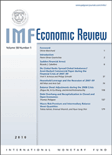
IMF Economic Review
Championing Open Access to Transform Economic UnderstandingIMF Economic Review, published by Palgrave Macmillan Ltd, stands as a preeminent journal in the fields of Economics and Business Management, holding a prestigious Q1 ranking in both categories as of 2023. With an ISSN of 2041-4161 and an E-ISSN of 2041-417X, this journal not only showcases high-quality, peer-reviewed research but also embraces the principles of Open Access, promoting wide dissemination of its findings to researchers, professionals, and students alike. Spanning significant years from 2010 to 2024, the IMF Economic Review features innovative analyses and insights that challenge conventional economic paradigms and foster deeper understanding of global economic dynamics. Its impressive Scopus ranking places it in the top 10% of economics journals globally, affirming its vital role in advancing academic discourse and practical application in economics and finance. For those dedicated to exploring the intricacies of economic theory and practice, the IMF Economic Review is an invaluable resource that not only informs but also inspires.
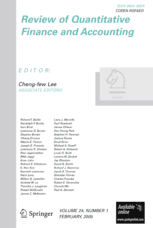
Review of Quantitative Finance and Accounting
Fostering Excellence in Financial Research and AnalysisThe Review of Quantitative Finance and Accounting, published by Springer, is a distinguished academic journal that has been at the forefront of scholarly discourse since its inception in 1991. With an ISSN of 0924-865X and an E-ISSN of 1573-7179, this journal specializes in the interdisciplinary realms of accounting and finance, particularly emphasizing quantitative methodologies and their applications in real-world scenarios. With an impressive track record reflected in its 2023 rankings, it sits in the Q2 category across key fields such as Accounting, Business Management, and Finance, demonstrating its relevance and influence within these domains. Although it operates without an Open Access option, the journal's content remains vital for researchers, professionals, and students aiming to deepen their understanding of quantitative approaches in finance and accounting contexts. The Review of Quantitative Finance and Accounting stands as an essential resource for advancing knowledge and fostering innovation within these critical disciplines.